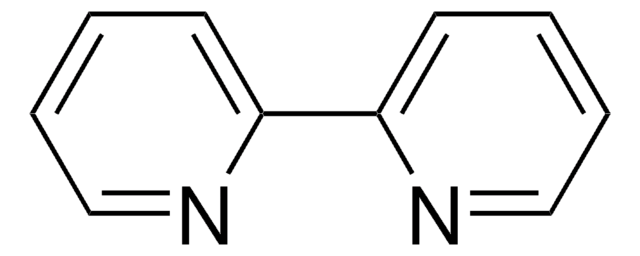735906
Copper(I) bromide
AnhydroBeads™, -10 mesh, 99.99% trace metals basis
Synonym(s):
Cuprous bromide
About This Item
synthesis grade
Recommended Products
grade
for synthesis
synthesis grade
product line
AnhydroBeads™
Assay
99.99% trace metals basis
form
beads
impurities
≤150.0 ppm Trace Metal Analysis
particle size
-10 mesh
mp
504 °C (lit.)
density
4.71 g/mL at 25 °C (lit.)
application(s)
battery manufacturing
SMILES string
[Cu]Br
InChI
1S/BrH.Cu/h1H;/q;+1/p-1
InChI key
NKNDPYCGAZPOFS-UHFFFAOYSA-M
Looking for similar products? Visit Product Comparison Guide
General description
Application
- catalyst in cross coupling reactions.
- co-catalyst in Sonogashira coupling.
- Lewis acid in enantioselective addition of alkynes.
- reducing agent, when complexed by three molecules of pyridine initiators for the controlled polymerization of styrene, methyl acrylate and methyl methacrylate.
Reductive homocoupling of α-bromo- α- chlorocarboxylates to dimethyl α, α′ dichlorosuccinate derivatives in presence of CuBr/LiOCH3 in methanol has been reported.
Legal Information
Signal Word
Danger
Hazard Statements
Precautionary Statements
Hazard Classifications
Acute Tox. 4 Dermal - Acute Tox. 4 Oral - Aquatic Acute 1 - Aquatic Chronic 1 - Eye Dam. 1 - Skin Irrit. 2
Storage Class Code
13 - Non Combustible Solids
WGK
WGK 3
Flash Point(F)
Not applicable
Flash Point(C)
Not applicable
Regulatory Listings
Regulatory Listings are mainly provided for chemical products. Only limited information can be provided here for non-chemical products. No entry means none of the components are listed. It is the user’s obligation to ensure the safe and legal use of the product.
PDSCL
Deleterious substance
ISHL Indicated Name
Substances Subject to be Indicated Names
ISHL Notified Names
Substances Subject to be Notified Names
JAN Code
735906-25G-PW:
735906-VAR:
735906-25G:4548173331706
735906-BULK:
Choose from one of the most recent versions:
Certificates of Analysis (COA)
Don't see the Right Version?
If you require a particular version, you can look up a specific certificate by the Lot or Batch number.
Already Own This Product?
Find documentation for the products that you have recently purchased in the Document Library.
Customers Also Viewed
Articles
Nanostructured Materials Through Ultrasonic Spray Pyrolysis
Nanostructured Materials Through Ultrasonic Spray Pyrolysis
Our team of scientists has experience in all areas of research including Life Science, Material Science, Chemical Synthesis, Chromatography, Analytical and many others.
Contact Technical Service











![Tris[2-(dimethylamino)ethyl]amine 97%](/deepweb/assets/sigmaaldrich/product/structures/695/792/ee0ff167-22a3-43a7-83a1-6c4908adf0ae/640/ee0ff167-22a3-43a7-83a1-6c4908adf0ae.png)
